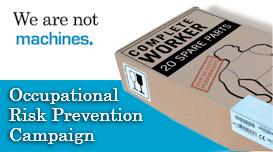Psychosocial Risks
2.2. Factors related to the work schedule:
2.2.1. Working day duration and scheduling
When studying the duration of the working day, it is necessary to consider the needs of the human organism as regards physical and mental recovery. The rest period must allow the person to recover from fatigue and should vary in length as a function of the greater or lesser amount of physical or mental activity carried out.
As regards the scheduling of the working day, we may distinguish between an uninterrupted working day, a working day with a scheduled break and flexitime. In general, a working day with a flexible timetable is recommendable, leaving leeway at the beginning and end of the working day that allows the worker to carry out personal activities.
2.2.2. Shift work
Shift work has a direct influence on health, the effect being greater or lesser depending on the person. The set of problems that shift work entails revolve around the consequences resulting from the constant change in working hours, the effect on family and social life of the afternoon/evening shift and the direct repercussions on health of the night shift.
Moreover, changes in timetables produce a series of consequences fundamentally related to the decrease in mental activity and in the capacity of attention and reaction, to nervous equilibrium and fatigue, together with sleep disorders that may have repercussions on physical health, on the risk of suffering an accident, on the quality of the task and on the role in the family.
2.2.3. Rest periods and breaks
The distribution of breaks is related to the type of working day, to the possibility of flexibility in the timetable and, above all, to the type of task (jobs involving VDUs, physical work, continuous Contact with customers, etc.).
As a general guideline, several short breaks and a longer break, roughly in the middle of the working day, may be proposed that allow a break from the activity being carried out.




